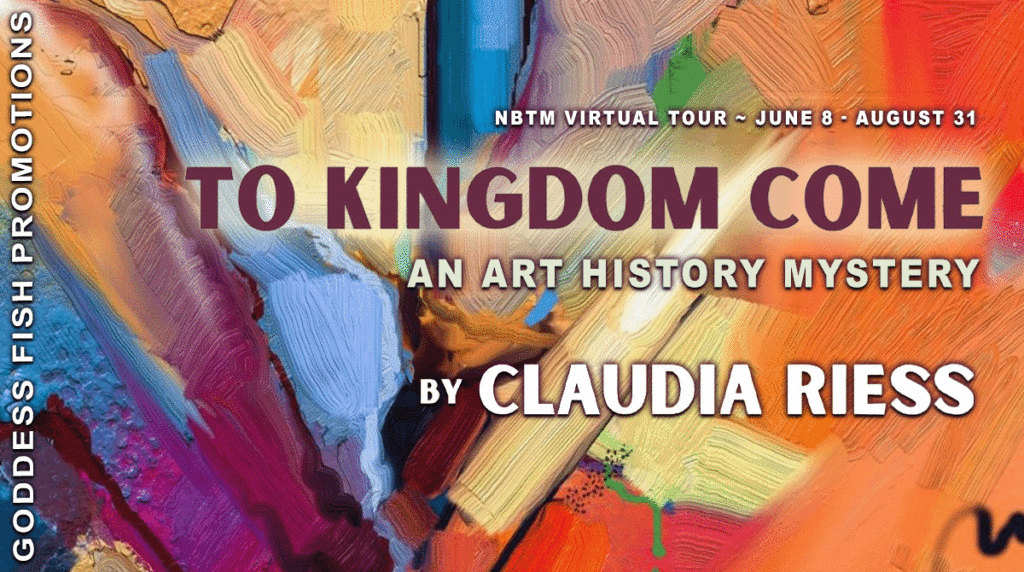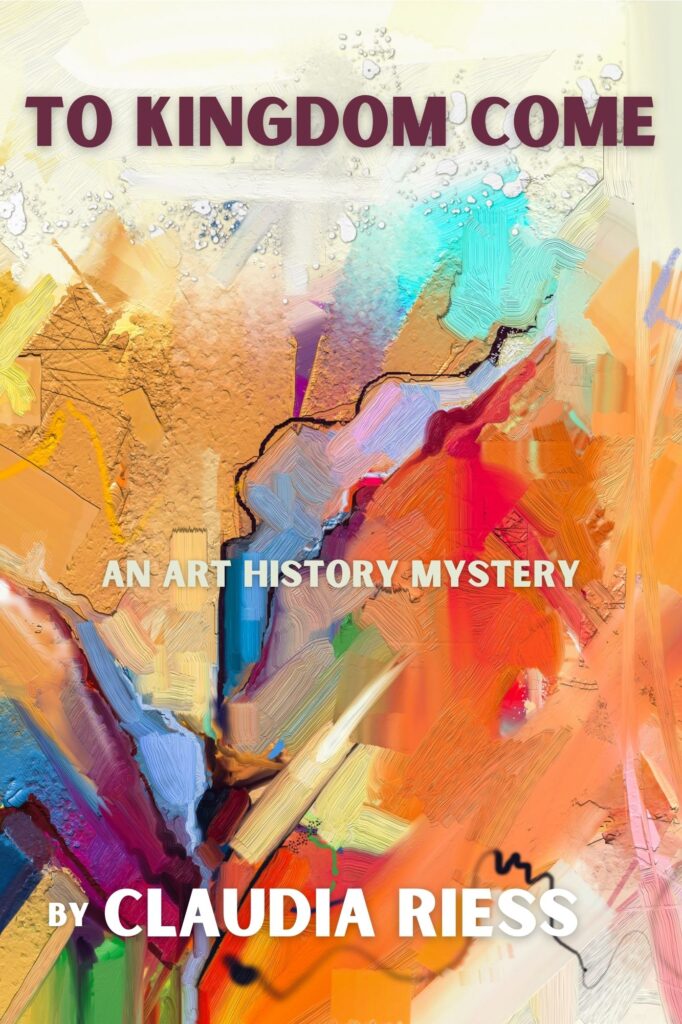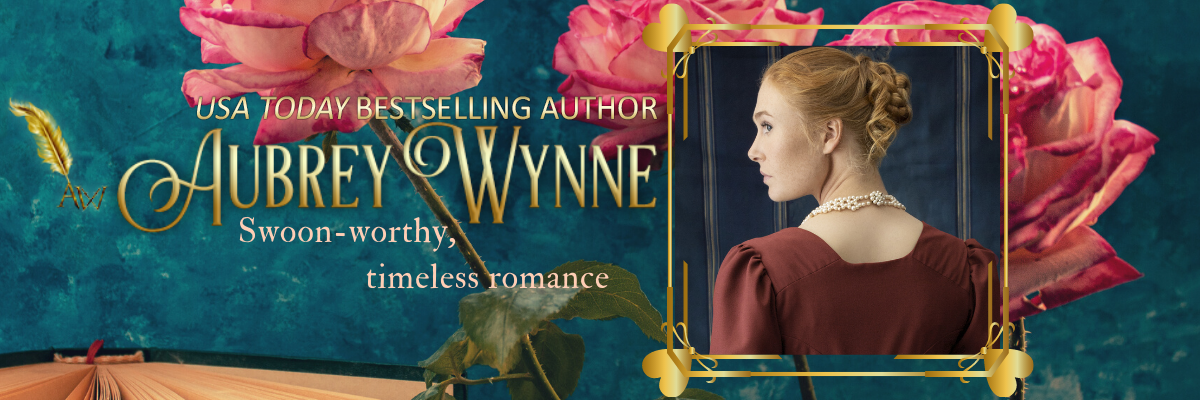TO KINGDOM COME by Claudia Riess with a guest post

Jumpstarting the Writing Session
The hardest part about writing is planting myself in my desk chair and raising the lid of my computer when I’m not viscerally compelled to do so. When I know exactly where a scene is headed and how my characters are about to interact, there’s no problem: I’m already typing in the air before I even log in.
Luckily, the problem has largely been eliminated. Instead of sitting down cold at the computer, I now take a couple of preparatory steps, so that there’s an actual transitioning from the state of Not Writing to Writing. I’ve found that when a ritual series of events is initiated, after a while the desired action flows naturally from it, requiring no prodding or coercion.
Here’s a typical ritual. First, I sort through the papers on my desk with notes on upcoming chapters. Some notes are scrawled on sheets torn from legal pads. Others are typed dialogue or expository bits. I separate the notes dealing with the chapter either in the works or about to start from all the upcoming chapters with a colored folder. Next, I arrange the notes in the order I anticipate their subjects will arise. After that, if there’s an upcoming historical, geographical, academic or environmental issue that requires a bit of research (the major research has already been done), I’ll Google it. An example: My characters will shortly be boarding a private jet. I’ve never been on or close to a private jet. I look up the subject, then study the photos and read the technical matter on dimensions, propulsion, flight staff.
The penultimate step, and maybe the most important because it’s just about as close to Pavlovian stimulus-response as it gets, is this: I prepare a hot beverage, usually tea, sometimes cocoa, and place it on a coaster in the open side-drawer of my desk (there’s no room on the top of my desk). The last step is virtually as instinctive as a dancer’s practiced leap: my body places itself in the desk chair while my fingers pinch the lid of my MacBook and raise it.
I take a sip of the beverage. I type my password and click open the manuscript I’m currently grappling with. The higher functions of my brain kick in, and I’m on my way. Sometimes I become too engrossed to ever getting around to taking a second sip.

To Kingdom Come
by Claudia Riess
GENRE: Mystery
BLURB:
Amateur sleuths, Erika Shawn-Wheatley, art magazine editor, and Harrison Wheatley, art history professor, attend a Zoom meeting of individuals from around the globe whose common goal is to expedite the return of African art looted during the colonial era. Olivia Chatham, a math instructor at London University, has just begun speaking about her recent find, a journal penned by her great-granduncle, Andrew Barrett, active member of the Royal Army Medical Service during England’s 1897 “punitive expedition” launched against the Kingdom of Benin.
Olivia is about to disclose what she hopes the sleuthing duo will bring to light, when the proceedings are disrupted by an unusual movement in one of the squares on the grid. Frozen disbelief erupts into a frenzy of calls for help as the group, including the victim, watch in horror the enactment of a murder videotaped in real time.
It will not be the only murder or act of brutality Erika and Harrison encounter in their two-pronged effort to hunt down the source of violence and unearth a cache of African treasures alluded to in Barrett’s journal.
Much of the action takes place in London, scene of the crimes and quest for redemption
Excerpt Two:
The first page identified the journal’s owner and date of inception in neatly penned script:
Andrew James Dexter Barrett Book One: 22 March 1897 – 17 August 1897 The subject of where Book Two and beyond might have gone off to was not raised because it would have been futile and, at least for now, irrelevant. Erika carefully turned the page to reveal the journal’s first entry, thankfully in that same legible, script: 22 March, homecoming. They read on, silently.
Hard to believe it has been less than ten weeks since the SS Malacca, cargo steamship refitted as a hospital ship, set forth for the Benin coast with me and my fellow medics aboard. It seems like a lifetime ago, perhaps because I have become a new man, or rather a newly awakened man, in the interim.
I have learned firsthand what history books and hearsay can only, at best, inadequately describe, and I will never again shut my eyes to the indignities and injustices we self-proclaimed entitled few, heap upon our brethren: those less fiscally sound as well as those of darker skin.
On Saturday, 20 March, when the ship pulled into Gosport, England, Father was waiting for me on the dock in top hat and frock coat, dapper as the nobleman he is. As I heave-hoed my laundry bag containing the rescued Benin treasures into our horse-drawn carriage, Father commented on its obvious weight. “What have you got in there?” he asked, with barely a trace of curiosity. “Medical books and instruments,” I answered without hesitation, realizing as I uttered the words that I had no intention of bringing him into my confidence.
I had been getting about on my own for years and could very well have hired a carriage to take me on the sixty-six-mile journey home, but Father had been adamant about accompanying me, even though it meant that both he and his coachman must overnight at an inn to, and again from, Gosport. In retrospect, I wonder if his intention, perhaps not conscious, was to use our extensive time alone to reclaim his control over me, since he did, after all, spend a good deal of time speaking of his activities in the House of Lords and pressing upon me the certainty that I was “marvelously suited” to that rewarding life. Mid-point between Gosport and Hertfordshire, we rented rooms at the inn in Guildford, where Father and the coachman had stayed the night before. To dilute Father’s lecture disguised as conversation, I must have consumed more ale that night than I had in the previous six months.
I awakened this morning well rested, but with a raging headache. Father must have taken pity on me because for the balance of our journey he eased up considerably on his mission to refashion me as a slightly taller version of himself. We arrived home late this evening, and Mother’s embrace and smile of relief comforted me no end. Never mind my goals in life. All that mattered to Mother was my safe return to Barrett Farms.
AUTHOR Bio and Links:
Claudia Riess is an award-winning author of seven novels, four of which form her art history mystery series published by Level Best Books. She has worked in the editorial departments of The New Yorker and Holt, Rinehart and Winston, and has edited several art history monographs. Stolen Light, the first book in her series, was chosen by Vassar’s Latin American history professor for distribution to the college’s people-to-people trips to Cuba. To Kingdom Come, the fourth and most recent, will be added to the syllabus of a survey course on West and Central African Art at a prominent Midwest university. Claudia has written a number of articles for Mystery Readers Journal, Women’s National Book Association, and Mystery Scene magazine. At present, she’s consulting with her protagonists about a questionable plot twist in Chapter 9 of the duo’s murder investigation unfolding in book 5; working title: Dreaming of Monet, scheduled for release winter 2024. For more about Riess and her work, visit www.claudiariessbooks.com.
All four books in the art history mystery series are available through Amazon.com, BarnesandNoble.com, IndieBound.org and at independent book stores. For bulk discount purchases, contact https://levelbestbooks.wordpress.com.
a Rafflecopter giveaway
Thanks for hosting!
What a beautifully written story. I loved it.
Thanks again, Marcia!
Thanks, Marcia! Glad you enjoyed the book!
I liked the excerpt.
Thanks so much for featuring my book on your blog, Aubrey! Much appreciated!
Thank you again, Rita!
An intriguing blurb and excerpt, To Kingdom Come sounds like a must read for me
Thanks for the kind words, Bea! Hope you enjoy the book!
The book sounds fabulous.
Thanks so much, Sherry!
The cover looks really good.
Thank you, Marcy!
Thank you Aubrey, for featuring my book on your blog! Much appreciated!
Claudia Riess is a fairly new author to me, but I look forward to reading this book.
Thank you for your kind comment, Audrey!
Looks like a good read
Marion
Thank you, Marion!
Thank you, Goddess Fish. Technical glitch fixed!